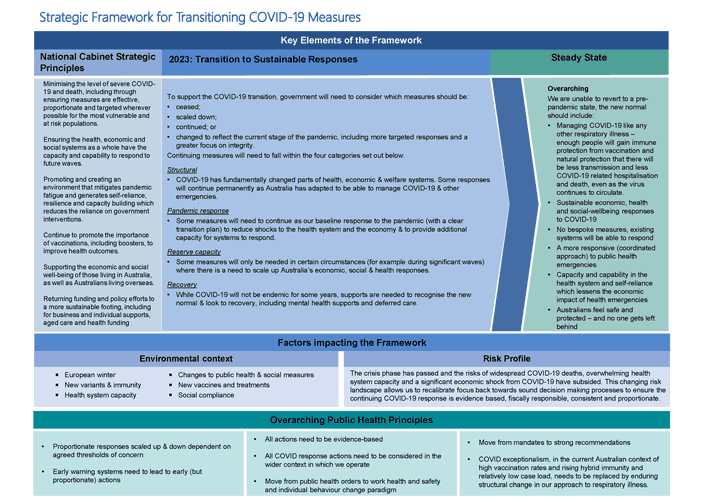National Cabinet
Key Elements of the Framework
National Cabinet Strategic Principles
- Minimising the level of severe COVID-19 and death, including through ensuring measures are effective, proportionate and targeted wherever possible for the most vulnerable and at risk populations.
- Ensuring the health, economic and social systems as a whole have the capacity and capability to respond to future waves.
- Promoting and creating an environment that mitigates pandemic fatigue and generates self-reliance, resilience and capacity building which reduces the reliance on government interventions.
- Continue to promote the importance of vaccinations, including boosters, to improve health outcomes.
- Supporting the economic and social well-being of those living in Australia, as well as Australians living overseas.
- Returning funding and policy efforts to a more sustainable footing, including for business and individual supports, aged care and health funding
2023: Transition to Sustainable Responses
To support the COVID-19 transition, governments will need to consider which measures should be:
- ceased;
- scaled down;
- continued; or
- changed to reflect the current stage of the pandemic, including more targeted responses and a greater focus on integrity.
Continuing measures will need to fall within the four categories set out below.
Structural
- COVID-19 has fundamentally changed parts of health, economic & welfare systems. Some responses will continue permanently as Australia has adapted to be able to manage COVID-19 & other emergencies.
Pandemic response
- Some measures will need to continue as our baseline response to the pandemic (with a clear transition plan) to reduce shocks to the health system and the economy & to provide additional capacity for systems to respond.
Reserve capacity
- Some measures will only be needed in certain circumstances (for example during significant waves) where there is a need to scale up Australia's economic, social & health responses.
Recovery
- While COVID-19 will not be endemic for some years, supports are needed to recognise the new normal & look to recovery, including mental health supports and deferred care.
Steady State
Overarching
We are unable to revert to a pre-pandemic state, the new normal should include:
- Managing COVID-19 like any other respiratory illness – enough people will gain immune protection from vaccination and natural protection that there will be less transmission and less COVID-19 related hospitalisation and death, even as the virus continues to circulate.
- Sustainable economic, health and social-wellbeing responses to COVID-19
- No bespoke measures, existing systems will be able to respond
- A more responsive (coordinated approach) to public health emergencies
- Capacity and capability in the health system and self-reliance which lessens the economic impact of health emergencies
- Australians feel safe and protected – and no one gets left behind
Factors Impacting the Framework
Environmental context
- European winter
- New variants and immunity
- Health system capacity
- Changes to public health and social measures
- New vaccines and treatments
- Social compliance
Risk profile
The crisis phase has passed and the risks of widespread COVID-19 deaths, overwhelming health system capacity and a significant economic shock from COVID-19 have subsided. This changing risk landscape allows us to recalibrate focus back towards sound decision making processes to ensure the continuing COVID-19 response is evidence based, fiscally responsible, consistent and proportionate.
Overarching Public Health Principles
- Proportionate responses scaled up and down dependent on agreed thresholds of concern.
- Early warning systems need to lead to early (but proportionate) actions.
- All actions need to be evidence-based.
- All COVID response actions need to be considered in the wider context in which we operate.
- Move from public health orders to work health and safety and individual behaviour change paradigm.
- Move from mandates to strong recommendations.
- COVID exceptionalism, in the current Australian context of high vaccination rates and rising hybrid immunity and relatively low case load, needs to be replaced by enduring structural change in our approach to respiratory illness.
